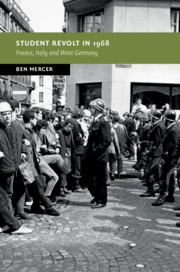Book contents
- Student Revolt in 1968
- New Studies in European History
- Student Revolt in 1968
- Copyright page
- Contents
- Acknowledgements
- Abbreviations
- Introduction: History, Myth and Memory of 1968
- Part I Education and Culture
- Chapter 1 The ‘Devouring Monster’
- Chapter 2 ‘New Managerial Class’ or ‘Social Doctor’?
- Chapter 3 ‘Books for All’
- Chapter 4 ‘Knowledge Is Over’
- Part II The Politics of Revolt
- Part III Crisis of the University
- Conclusion
- Select Bibliography
- Index
Chapter 4 - ‘Knowledge Is Over’
The Intellectual Politics of 1968
from Part I - Education and Culture
Published online by Cambridge University Press: 18 November 2019
- Student Revolt in 1968
- New Studies in European History
- Student Revolt in 1968
- Copyright page
- Contents
- Acknowledgements
- Abbreviations
- Introduction: History, Myth and Memory of 1968
- Part I Education and Culture
- Chapter 1 The ‘Devouring Monster’
- Chapter 2 ‘New Managerial Class’ or ‘Social Doctor’?
- Chapter 3 ‘Books for All’
- Chapter 4 ‘Knowledge Is Over’
- Part II The Politics of Revolt
- Part III Crisis of the University
- Conclusion
- Select Bibliography
- Index
Summary
Chapter 4 analyses the cultural politics of the protest movements. It traces the way students sought to democratise access to high culture, revise the content of high culture for a new era and abolish the distinction between high and low culture altogether, while also succumbing at times to the temptation of anti-intellectualism. I argue that the cultural drives of the protest movement – democratisation of access, desacralisation and anti-intellectualism – proved contradictory, ultimately leaving unfulfilled the diverse goals of the movement. The period of the late 1960s was marked by both a collapse of the traditional idea of high culture and the inability to find a consensus on what should replace it.
- Type
- Chapter
- Information
- Student Revolt in 1968France, Italy and West Germany, pp. 88 - 104Publisher: Cambridge University PressPrint publication year: 2019

